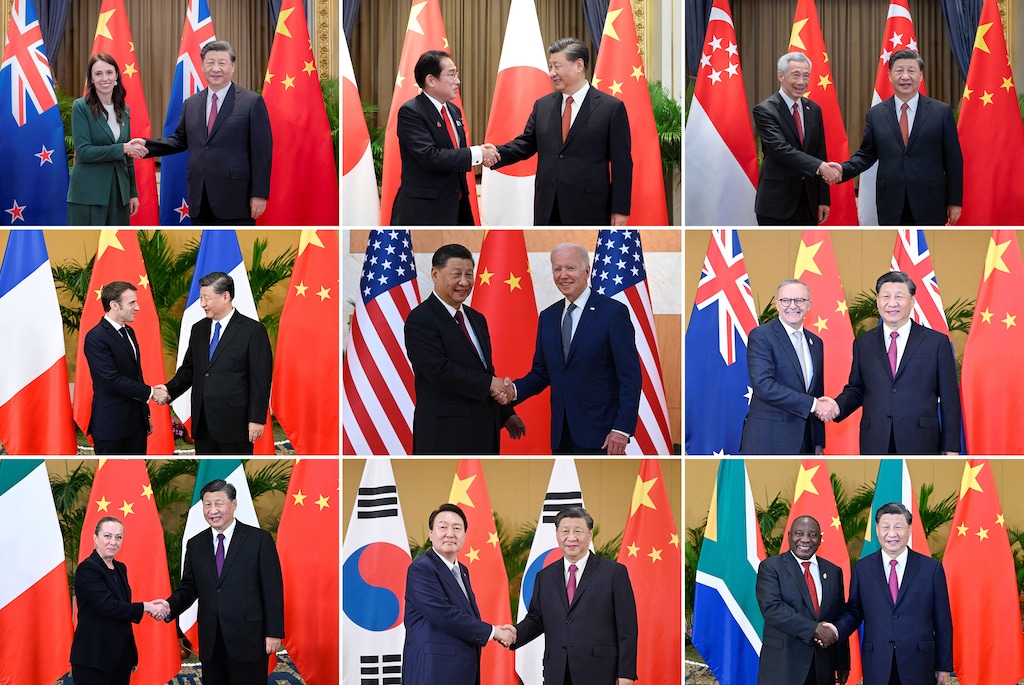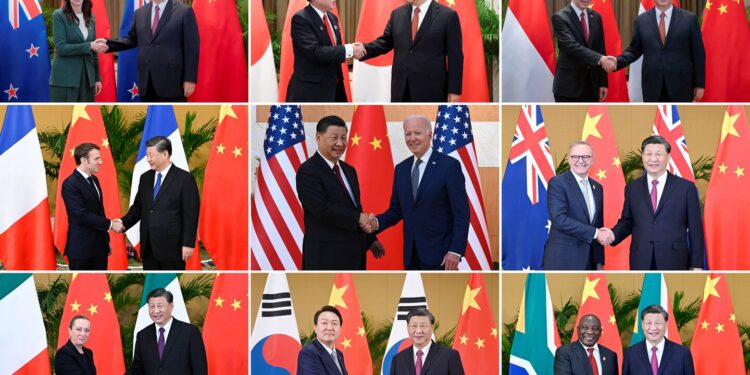
After nearly three years of remaining secluded within its borders, Shi was on a global sorcerer attack. In the six weeks since then He got a new term As head of the Chinese Communist Party and the Chinese army, which paved the way for him to rule indefinitely, he formally met with no less than 26 heads of state or government from every continent.
The campaign continues even as Xi faces a wave of domestic opposition unseen in decades, sparked by the “eradicate the virus” policies he has personally championed to keep the coronavirus at bay within his borders.
Hours after demonstrators protested in Beijing last week – some declaring “We don’t want dictatorship!” – held a welcoming ceremony several miles away for Mongolian President Okhnagin Khurlsukh. And on Thursday, when police in many cities knocked on people’s doors and detained them for taking part in demonstrations, Xi met European Council President Charles Michel and called for “peaceful coexistence” between China and the European Union.
This new attitude deviates from the “wolf warrior” style that the Shi nation was known for during the epidemic. It is a sign that even China’s most ideological leader in decades can become pragmatic, working to repair strained relations and improve a damaged international image.
“The world is changing, and China is changing. How to prevent strategic miscalculation and unnecessary international tension and conflict is something that Chinese diplomacy must consider now,” said Liu Jiangyong, a professor of international relations of Tsinghua University in Beijing.
However, “Xiplomacy” – as state media calls his leadership over the country’s foreign policy – is fundamentally about competing with the United States and its allies, enhancing its legitimacy at home, calming domestic unrest and paving the way for China. The Rise as a Socialist Superpower on a less hostile world stage.
At a welcome dinner during the G20 summit last month in Bali, Xi I spoke with Indian Prime Minister Narendra Modi in their first public exchange since deadly clashes between Chinese and Indian soldiers on the China-India border in 2020. Xi met Albanese on the sidelines of the event after years of deteriorating relations marked by ridicule in the Chinese media. Australia as “gum stuck in China’s shoe”.
Most notable was Xi’s three-hour meeting with Biden. That encounter was watched so closely that it almost became its own top within the top – with potential consequences to match. The two leaders Show concern to prevent spiraling tensions which leads to conflict. They agreed to Resume paused conversations on me Including climate changeAs well as preparing for US Secretary of State Antony Blinken’s visit to China.
Xi traveled to attend the Asia-Pacific Economic Cooperation Conference in Bangkok and, in a one-on-one meeting with Japanese Prime Minister Fumio Kishida, urged the two traditional rivals to see each other as “partners, not threats.”
“Xi’s pragmatic shift is self-interested and aims to strengthen China’s hand in pursuit of its long-term goals,” said Amanda Hsiao, senior China analyst at the International Crisis Group. “China still sees itself in a long-term conflict with the United States, but the easing of tensions for now – perhaps temporarily – helps Beijing compete with Washington in the long term.”
During the many months that China physically It closed itself off from the world over the coronavirus. Officials have responded aggressively to criticism about the country’s role in the pandemic, its crackdown on Uyghurs and other ethnic minorities in Xinjiang province, its crackdown on democracy supporters in Hong Kong, and its escalation of violence. Threats towards Taiwan and its support for Russia during President Vladimir Putin’s war in Ukraine.
Xi only spoke on the phone with his counterparts during this period. In September, it is He ventured abroad for the first time in nearly three years To visit Kazakhstan, and then attend the Shanghai Cooperation Organization summit in Samarkand, Uzbekistan.
In early November, Xi welcomed German Chancellor Olaf Scholz to Beijing and called on the two countries to seek common ground and work together in a time of “change and chaos.” He used a similar tone repeatedly in comments after his G-20 meetings.
“Xi Jinping in Bali was not a wolf warrior. The wolf warrior’s diplomacy is more bitter, angry and blunt. This seems to convey a response to a sense that China is losing the global PR game,” said Nisun Mahboubi, a visiting research scholar at the University of Pennsylvania’s Center for the Study of Contemporary China.
The renewed focus on diplomacy is also a way for the 69-year-old Xi to strengthen his hand at home at a critical time. His government is grappling with potentially crippling US export restrictions targeting Chinese technology, an economic slowdown and mounting public anger over tough pandemic lockdowns.
critics abroad, to a limited extent within China They accused him He takes his own back. His high-level meetings with world leaders are meant to help legitimize his grip on power. The Pictures It filled the Chinese front pages and got a buzz on social media.
“It’s a glorification and affirmation of his third term,” said Yun Sun, director of the China Program at the Stimson Center in Washington. “The goal was to show a great return of China and himself to the world stage. China is back and Xi is back stronger.”
Meanwhile, there was no mention in state media of the demonstrations challenging his authority – the largest such rallies since the 1989 pro-democracy protests that ended in a massacre around Tiananmen Square. Marches in solidarity in cities outside China were also ignored, and participants also denounced Xi’s leadership.
Neither Xi nor other senior party officials directly addressed the unrest. It is unclear how weak his hand can be in dealing with other world leaders.
Regardless, a change in Xi’s tone while abroad is unlikely to truly reduce the potential for conflict unless it is accompanied by fundamental changes in policy. China’s positions have not changed Flash points including Taiwanwhich Beijing claims as its own territory and says it will seize by force if necessary, and its territorial claims in the South China Sea.
“Xi’s point of view is really one to one. If you engage, they will engage. If you want to punch, Xi will punch,” said Jessica Chen Weiss, China expert at Cornell University. “We may look back and see Bali as an inflection point, where you may start to settle down and not accelerate so quickly toward confrontation.”
Xi’s image as friendlier at the G-20 was further undermined by a caught-on-camera moment as he spoke with Canadian Prime Minister Justin Trudeau.
Speaking through an interpreter, Xi told Trudeau that it was “not appropriate” for him to brief the Canadian media about an informal meeting between the two men. Trudeau interrupted Xi and defended himself, stressing the importance of free and open dialogue.
“Let’s create the conditions first,” Shi replied curtly, and then muttered another word as he walked away: “Naive.”
The video was banned inside China, but the impression Xi made on the international stage was that it would quickly turn to criticism and belligerence.
“The real test of whether wolf warrior diplomacy still prevails is how China reacts when it feels pressure,” said Sun of the Stimson Center. “Beijing is more willing to repair or maintain good relations, but that doesn’t mean it won’t bite when it feels threatened or offended.”
Vic Chiang in Taipei and Lyric Lee in Seoul contributed to this report.


























